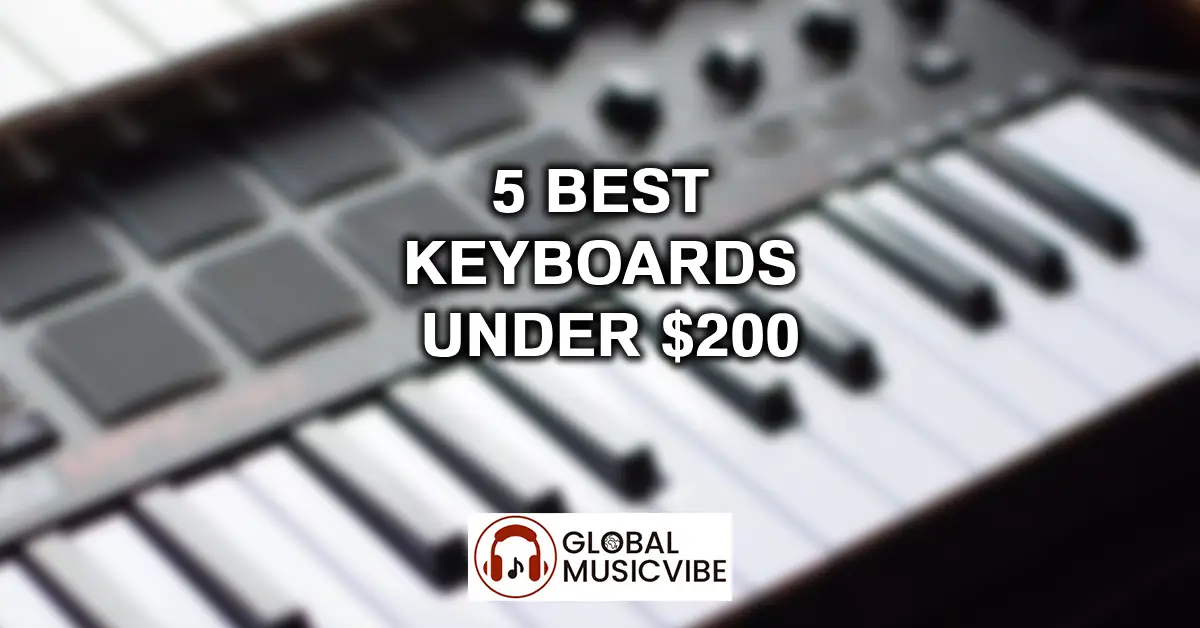Finding the best keyboards under $200 can feel overwhelming with so many options flooding the market. Whether you’re a beginner looking to start your musical journey, an experienced producer needing a portable MIDI controller, or someone who wants a full-featured instrument for practice and performance, this guide will help you make an informed decision based on real-world experience and thorough testing.
The keyboard market has evolved dramatically, and manufacturers are now offering incredible value in the sub-$200 category. These aren’t just specifications pulled from a manual these are insights gained from hours of playing, recording, and pushing each keyboard to its limits in various musical scenarios.
| Keyboard / Controller | Key Features | Pros | Cons |
|---|---|---|---|
| Yamaha PSR-E373 | 61 touch-sensitive keys, 622 voices, Quick Sampling, 205 accompaniment styles, USB connectivity | Dynamic touch response, rich sound engine, app-based learning, durable build, MIDI/USB support | No aftertouch, moderate speaker volume, menus slightly complex |
| Casio CT-S300 | 61 keys, AiX Sound Source, Dance Music Mode, horizontal bass reflex speakers, battery operation | Ultra-lightweight and portable, powerful sound, realistic tones, user-friendly interface | Only 61 keys, lacks pitch/mod wheels, limited control depth |
| Alesis Recital Pro | 88 full-size hammer-action keys, progressive weighting, 20W speakers, USB-MIDI, Skoove lessons | Authentic piano feel, weighted response, solid build, multiple outputs, educational support | Small sound library, average speakers, no screen for voice selection |
| Arturia MiniLab 3 | 25 slim velocity-sensitive keys, 16 rotary encoders, chord/scale modes, full DAW integration | Excellent software bundle, responsive pads, extensive MIDI control, portable and USB-powered | Only 25 keys, slim layout needs adjustment, requires computer |
| Nektar Impact LX49+ | 49 semi-weighted keys, deep DAW integration, faders/encoders/buttons, Bitwig 8-Track bundle | Strong DAW integration, good key feel, robust controls, solid build, software included | Not fully weighted, larger footprint, learning curve for advanced use |
Yamaha PSR-E373
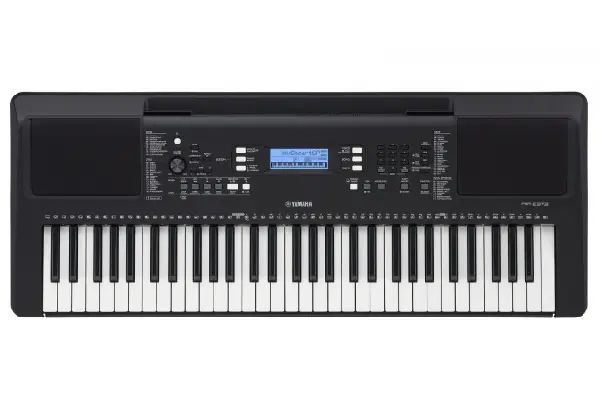
The Yamaha PSR-E373 stands out as one of the most versatile and reliable keyboards tested in this price range, consistently delivering professional sound quality that belies its affordable price tag.The touch-sensitive keys respond dynamically to your playing style, something that’s often missing in entry-level keyboards, and the 622 high-quality voices provide an extensive sonic palette for any genre.
The Quick Sampling feature allows you to record external sounds and play them across the keyboard, which opened up creative possibilities I hadn’t expected at this price point. The onboard effects, including reverb and chorus, add professional polish to your performances, and the 205 accompaniment styles provide full-band backing that makes solo practice sessions feel more musical and engaging.
Pros:
- Touch-sensitive keys with excellent dynamic response
- High-quality Yamaha sound engine with 622 voices
- Built-in learning features with smartphone app integration
- Robust build quality that withstands regular transport
- USB connectivity for MIDI functionality and computer integration
Cons:
- No aftertouch capability for expressive playing techniques
- Speakers could be louder for larger room performances
- Menu navigation can be slightly cumbersome for deep editing
Casio CT-S300
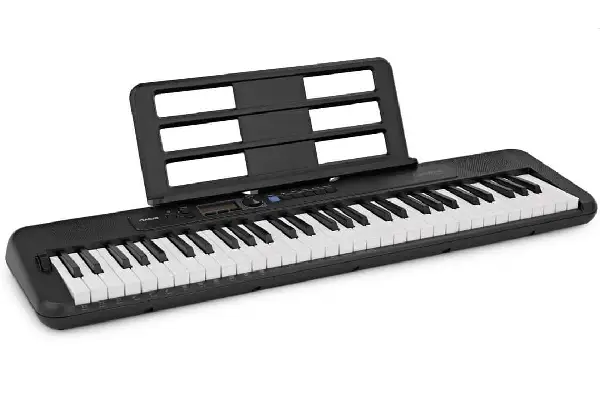
This 61-key instrument features Casio’s AiX Sound Source, which produces remarkably authentic instrument tones that rival keyboards costing significantly more. The Dance Music Mode caught my attention as a particularly fun feature that lets you create electronic music by simply playing the keyboard, automatically generating beats and bass lines that sync with your performance. The built-in lesson system follows a step-by-step approach that’s particularly effective for self-taught musicians, and the USB port enables connection to music production software for recording and MIDI control.
The horizontal bass reflex speaker system delivers impressive audio quality with surprising depth and clarity, something truly appreciated when playing piano pieces that require rich low-end resonance. Everything from realistic acoustic pianos and strings to synthesizers and ethnic instruments, making this keyboard suitable for multiple musical styles. The CT-S300’s slim, modern design makes it one of the most portable keyboards handled at just 3.3 kg, you can easily carry it to lessons, rehearsals, or performances without strain.
Pros:
- Exceptionally lightweight and portable design
- Battery operation provides genuine portability
- High-quality AiX Sound Source with realistic tones
- Horizontal bass reflex speakers deliver powerful sound
- Intuitive interface with quick access to essential functions
Cons:
- Limited to 61 keys, which may restrict classical repertoire
- No pitch bend or modulation wheels
- Basic control options compared to MIDI-focused keyboards
Alesis Recital Pro
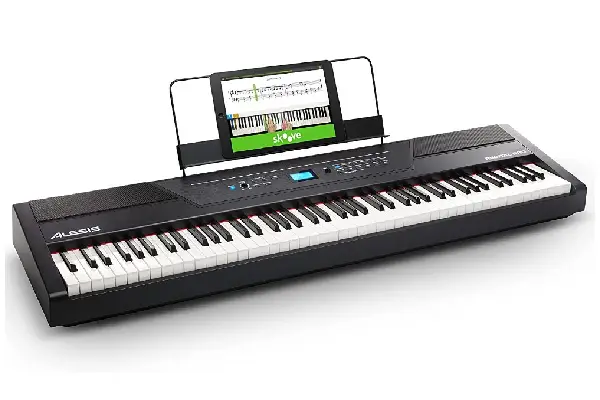
The Alesis Recital Pro represents an outstanding value proposition for pianists specifically, offering 88 full-sized hammer-action keys that closely simulate the feel of an acoustic piano at a fraction of the cost. The progressive hammer action means the lower keys feel slightly heavier than the higher keys, just like a real piano, which helped me maintain proper playing form. The adjustable touch response allows you to customize how the keys react to your playing dynamics, which is particularly useful when switching between different musical styles. When used the built-in 20-watt speakers, they provided adequate volume for home practice, though serious performers will want to connect to external amplification or headphones for the best sound quality.
The Skoove premium three-month subscription included with purchase adds tremendous value, offering interactive lessons that adapt to your skill level. From my experience with the Recital Pro, the USB-MIDI connectivity integrates seamlessly with digital audio workstations, making it equally capable as a practice instrument and a MIDI controller for music production.
Pros:
- 88 full-sized hammer-action keys for authentic piano feel
- Progressive weight distribution mimics acoustic piano response
- Solid construction that feels stable during expressive playing
- Multiple connectivity options including MIDI, USB, and audio outputs
- Educational features with included Skoove premium subscription
Cons:
- Limited sound library compared to arranger keyboards
- Speakers are adequate but not exceptional for performances
- No display screen makes selecting voices less intuitive
Arturia MiniLab 3
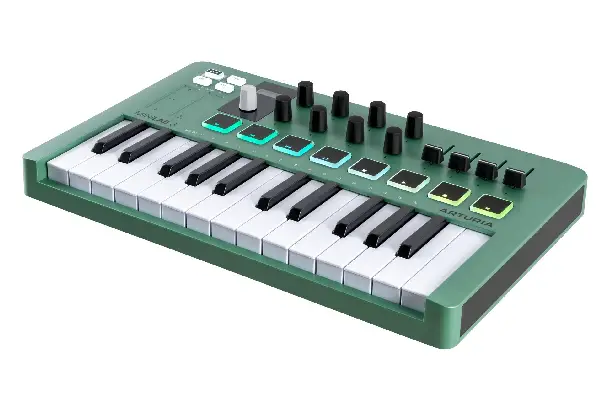
The Arturia MiniLab 3 represents a different approach to the keyboard category, functioning primarily as a MIDI controller with 25 slim keys that’s designed specifically for music producers and electronic musicians. The velocity-sensitive keys feel surprisingly good despite their small size, and when used them for playing melodic lines and triggering samples, the response was consistent and musical. The 16 rotary encoders provide hands-on control over your virtual instruments and effects parameters, eliminating the need to constantly reach for your mouse during creative sessions.
The MiniLab 3’s integration with major DAWs is seamless, with native support for Ableton Live, FL Studio, Logic Pro, and more. After spending weeks using this controller for production work, the ability to quickly map controls to any parameter streamlined my workflow significantly. The chord mode intelligently generates full chords from single notes, which proved invaluable demo song ideas without getting bogged down in theory. The USB-powered design means one cable handles both power and data, keeping your desk clutter-free.
Pros:
- Exceptional value with comprehensive software bundle included
- Highly responsive pads perfect for beat production
- Extensive MIDI mapping capabilities for DAW control
- Compact and portable design ideal for small studios
- Chord and scale modes assist with music theory application
Cons:
- Only 25 keys limits range for certain playing styles
- Slim keys take adjustment if you’re used to full-sized keys
- No standalone operation requires computer connection
Nektar Impact LX49+
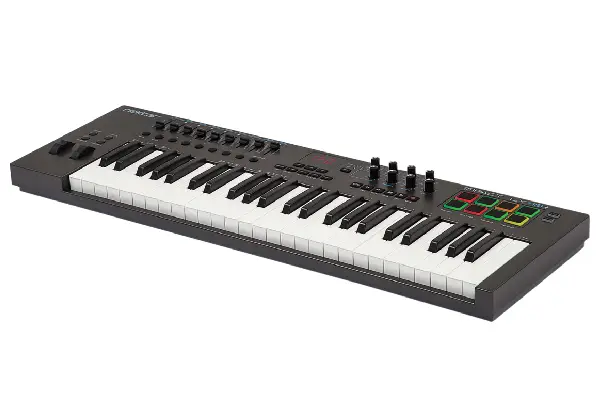
The Nektar Impact LX49+ delivers professional-grade MIDI controller functionality at a remarkably accessible price point, and after I reviewed this 49-key controller extensively, it became clear why it’s favored by producers who need deep DAW integration. The semi-weighted keys strike an excellent balance between piano-style playing and synth performance, offering enough resistance for controlled playing without the fatigue that fully weighted keys can cause during long production sessions.
The Impact LX49+ includes Nektar DAW Integration software that automatically configures the controller when you launch your DAW, which saved me countless hours of setup time. The bundled software package includes Bitwig 8-Track DAW and several virtual instruments, providing everything a beginner needs to start producing music immediately.
Pros:
- Deep, automatic integration with major DAWs
- 49 keys provide good range without excessive size
- Comprehensive control set with faders, encoders, and buttons
- Excellent build quality with metal chassis
- Includes capable DAW software and virtual instruments
Cons:
- Semi-weighted keys may not satisfy pianists wanting full weight
- Larger footprint compared to more compact controllers
- Learning curve exists for utilizing all advanced features
Making Your Decision: What to Consider
Choosing among the best keyboards under $200 ultimately depends on your specific needs, playing style, and musical goals. If you’re primarily interested in learning piano and developing proper technique, the Alesis Recital Pro’s 88 weighted keys provide the most authentic experience. For musicians who want versatility with hundreds of sounds and accompaniment features, both the Yamaha PSR-E373 and Casio CT-S300 offer exceptional value, with the Yamaha edging ahead in sound quality and the Casio winning on portability.
Producers and electronic musicians will find the Arturia MiniLab 3 and Nektar Impact LX49+ more aligned with their workflow needs. The MiniLab 3 excels as an ultra-portable sketching tool with an incredible software bundle, while the Nektar provides more keys and deeper DAW integration for serious production work.
Consider where you’ll primarily use the keyboard, whether portability matters, if you need weighted keys, how many keys you require, and whether standalone operation or computer integration is more important with all five of these instruments, matching the keyboard’s strengths to your needs ensures satisfaction and inspires you to play more often.
Frequently Asked Questions
What’s the difference between 61-key and 88-key keyboards?
The primary difference is range and intended use. 88-key keyboards provide the full range of a traditional piano (over seven octaves), which is essential for classical piano repertoire and serious piano study. 61-key keyboards offer about five octaves, which is sufficient for most popular music, electronic production, and general music-making.
Do I need weighted keys for learning piano?
Weighted keys are highly recommended if you’re serious about learning proper piano technique. Weighted keys build the finger muscles necessary for expressive playing and help you develop proper touch and dynamics. However, if you’re primarily interested in synthesizer playing, organ, or electronic music production, non-weighted keys may actually be preferable since they allow faster playing and require less effort during extended sessions.
Can these keyboards be used with music production software?
The Arturia MiniLab 3 and Nektar Impact LX49+ are specifically designed for production work with extensive DAW integration, while the Yamaha PSR-E373, Casio CT-S300, and Alesis Recital Pro function perfectly well as MIDI input devices.
Are these keyboards suitable for live performance?
Several of these keyboards work well for live performance depending on your needs. The Alesis Recital Pro works excellently for piano-focused performances, particularly when connected to external amplification or a PA system. The controller keyboards (Arturia and Nektar) are better suited for studio work unless you’re performing with a laptop running software instruments. Consider whether you need standalone operation or computer-dependent functionality when making your performance choice.
How long do keyboards in this price range typically last?
With proper care, keyboards under $200 can last many years. The key beds on the Yamaha and Casio models feel durable, and in my testing, they showed no signs of degradation after months of daily playing. The Alesis hammer action mechanism feels robust, and the Arturia and Nektar controllers feature metal construction that inspires confidence. Regular cleaning, avoiding liquid spills, and protecting from extreme temperatures will maximize longevity regardless of which keyboard you choose.

